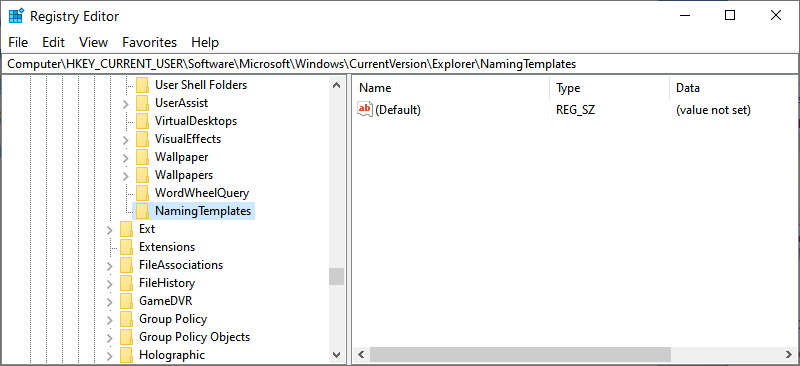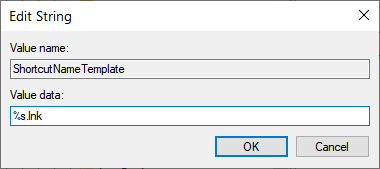A handy feature often used on Windows computers is creating shortcuts. Shortcuts are handy ways to link to items such as folders, files, apps, and more. To better understand shortcuts, look at our Understanding Shortcuts article.
When you create a shortcut Windows creates an icon that looks similar to the item your shortcut links to and will have two additional identifiers—a curved arrow icon in the lower-left corner of the icon and the text "- Shortcut" added at the end of the shortcut's name. If you find that you typically rename your shortcut by removing the "- Shortcut" text or you would prefer to change the appended text, you can do so using the Registry Editor within Windows 10. In two other tips, we have covered how to modify the default name for new folders and how to change the name of copied folders. If you followed those two articles much of what you do in this tip will be familiar.

Figure 1. New subkey named NamingTemplates.

Figure 2. CopyNameTemplate with new value data entered.
With this change, when you create a new shortcut the term "- Shortcut" will not be added to the end of the shortcut file name. If you prefer to add a different term in step 9 change "%s.lnk" to "%s YOUR TERM.lnk". If you add a term such as "%s (Just Another Shortcut).lnk" your shortcut will have "(Just Another Shortcut)" added to the end of the shortcut name.
As you make these changes you can really start to control how Windows works in your environment, having your system create files that make sense to you and your workflow.
![]() This tip (13731) applies to Windows 10.
This tip (13731) applies to Windows 10.
Dvorak keyboards can provide more efficient typing as well as make the keyboard characters more accessible to those who ...
Discover MoreReadyBoost promised to provide a hot-swappable addition of memory that could end up improving system performance. Whether ...
Discover MoreWith multiple devices used today, the way we scroll can change depending on the device. If you're used to reverse ...
Discover More2023-12-09 20:47:30
Luca
Amazing Tutorial! I managed to achieve what I wanted, ,any thanks :)
Copyright © 2026 Sharon Parq Associates, Inc.
Comments